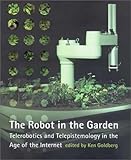The Robot in the Garden: Telerobotics and Telepistemology in the Age of the Internet (Leonardo Books)
The Robot in the Garden: Telerobotics and Telepistemology in the Age of the Internet (Leonardo Books)

The Robot in the Garden initiates a critical theory of telerobotics and introduces telepistemology, the study of knowledge acquired at a distance. Many of our most influential technologies, the telescope, telephone, and television, were developed to provide knowledge at a distance. Telerobots, remotely controlled robots, facilitate action at a distance. Specialists use telerobots to explore actively environments such as Mars, the Titanic, and Chernobyl. Military personnel increasingly employ reconnaissance drones and telerobotic missiles. At home, we have remote controls for the garage door, car alarm, and television (the latter a remote for the remote). The Internet dramatically extends our scope and reach. Thousands of cameras and robots are now accessible online. Although the role of technical mediation has been of interest to philosophers since the seventeenth century, the Internet forces a reconsideration. As the public gains access to telerobotic instruments previously restricted to scientists and soldiers, questions of mediation, knowledge, and trust take on new significance for everyday life. Telerobotics is a mode of representation. But representations can misrepresent. If Orson Welles's "War of the Worlds" was the defining moment for radio, what will be the defining moment for the Internet? As artists have always been concerned with how representations provide us with knowledge, the book also looks at telerobotics' potential as an artistic medium. The seventeen essays, by leading figures in philosophy, art, history, and engineering, are organized into three sections: Philosophy; Art, History, and Critical Theory; and Engineering, Interface, and System Design.It may be trite to say that new technology changes the way we see ourselves and the world, but it's crucial that we explore those changes fully. In The Robot in the Garden, computer scientist Ken Goldberg curates a collection of essays on telerobotics by critics, philosophers, and engineers, addressing questions as fundamental as, "How does mediation affect the knowledge we acquire?"
This book is a heady look at how remotely operated machines are affecting our beliefs and understanding of our interactions with each other and with the environment; while it's unlikely that every piece will interest every reader, anyone concerned with the future of art, technology, or society will find plenty to think about. Judith Donath, of MIT's Media Lab, asks how we define identity over the Internet and other electronic means of distant communication. Media art critic Machiko Kusahara reviews the current work of five telerobotic artists and their questioning of attitudes toward fundamental concepts like presence and absence. Philosopher Hubert L. Dreyfus cuts to the chase and examines knowledge itself in "Telepistemology: Descartes's Last Stand." Knowing that we know something is hard enough without miles of cables between our minds and the objects of our knowledge, but is technologically mediated information really different in kind?
Eighteen essays in all contribute to the discussion of remote action. As we expand our bodies to include webcam eyes and robot arms, such questions become more and more important to thinking people, and we can start looking for answers with The Robot in the Garden. --Rob Lightner

List Price: $ 25.00
Price: $ 12.91
Find More Internet Products
No comments:
Post a Comment